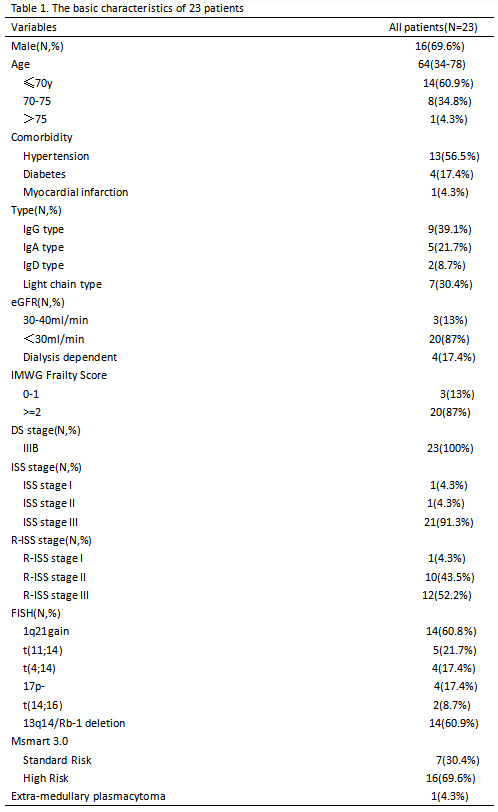Background: Renal impairment (RI) is one of the common serious complications of MM. The DARE Phase 2 clinical study is daratumumab-based regimen for the treatment of MM patients with renal insufficiency, which is designed to use daratumumab in combination with dexamethasone for the treatment of RRMM with severe renal insufficiency. According to the updated data, after 8.3 months of follow-up, the 6-month PFS rate was 48.6%, ORR was 41.4%, renal response rate (RRR) was 20.7%. CASSIOPEIA phase III clinical study showed that with the extension of treatment time, the sCR rate and minimal residual disease (MRD) negative rate in D-VTd group were significantly improved compared with those in VTd group. According to the evidence from previous large phase III clinical trials of daratumumab in NDMM as well as its DARE phase II study and clinical case reports, daratumumab based treatment has a rapid onset of action in the treatment of MM patients with severe renal insufficiency, effectively response to the disease and improve the renal function of patients. An observational, multi-center, non-interventional study was designed to evaluate the safety and efficacy of daratumumab in combination with VTD in NDMM patients with renal dysfunction in real-world clinical practice. (NCT 05561049)
Methods:NDMM patients older than 18 years and with a glomerular filtration rate(eGFR) of less than 40 ml/min were enrolled. Patients received VTD for C1, then go to DaraVTD for C2-4. The dose of Daratumumab was 16 mg/kg I.V. every week for 2cycles(cycles 2-3) , 16 mg/kg I.V. every 2 weeks for one more cycles;“Thalidomide”: 100 mg, P.O., Days 1-28/1-4 cycles;“Bortezomib”: 1.3 mg/m2, SC, Days 1, 4, 8, 11/1-4 cycles; Dexamethasone: 20-40mg, PO/I.V., qw/1-4 cycles. After induction therapy, patients entered consolidation therapy. Transplant eligable patients undergo stem cell collection and autologous stem cell transplantation followed by consolidation with DVTd regimen for 2 more cycles. Four more cycles of consolidation with DVTd were performed in transplant ineligible patients. The primary endpoint of this study is to evaluate VGPR+ rate after consolidation. The secondary endpoint is ORR, renal response rate (RRR), CR rate, MRD negativity after consolidation, and DOR, PFS, OS. NCI CTCAE V5.0 criteria were used to evaluate adverse events.
Result: From Jan 1th to June 30 th 2023, 23 patients were enrolled. The median age of these 23 patients was 64 (34-78), 69.6%(16/23) was male.(Table 1)
Among the 18 patients who have had response evaluation, the ORR was 94.4%. median onset time of response was 2 months. After induction therapy, the ORR was 100%, 50% patients had gotten CR. After consolidation, All patients were above VGPR and CR and were NGS MRD negative.55.5% patients(10/18) achieved renal remission after one cycle, while 86.7% after 2 cycles, 91.7% after 3 cycles and 100% after 4cycles.
Among the 20 patients who have had adverse events evaluation. The main treatment-related adverse events were hematological toxicity, including neutropenia (n=10/20, grade 1-2 for 6 pts and grade 3-4 for 4 pts), lymphopenia (n=5/20, grade 1-2 for 5 pts) and thrombocytopenia (n=8/20, grade 1-2 for 6 pts and grade 3-4 for 2 pts). One patient with acute pancreatitis had to stop treatment. Other toxicities to date included pneumonia (n=5/20, grade 1 for 4 pts and grade 2 for 1 pts), peripheral neuropathy (n=10/20, grade 1 for 7 pts and grade 2 for 3 pts), and rash(n=5). The infusion related reactions were 37.5%(n=6/18, grade 1 for 4 pts and grade 2 for 2 pts).
Conclusion: In Chinese NDMM patients with RI, quad-drug induction of DVTD with/without ASCT consolidation showed nice tolerability and high overall response of disease even with a high percentage of high-risk patients. This preliminary study also suggested excellent efficacy with rapid improvement in renal function. The most common adverse events were hematological toxicity. Updated results will be presented at the following phase.
Disclosures
No relevant conflicts of interest to declare.


This feature is available to Subscribers Only
Sign In or Create an Account Close Modal